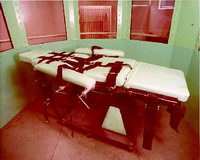Lawmakers in New Jersey to decide whether to overrule death penalty
New Jersey lawmakers will decide within two months whether to abolish the death penalty.

If approved by the Legislature and Gov. Jon S. Corzine, a death penalty opponent, the move would make New Jersey the first state to abolish capital punishment since the Supreme Court reinstated it in 1976.
"The time has come," Assembly Speaker Joseph Roberts Jr. said after a breakfast meeting in his office with Sister Helen Prejean, the Roman Catholic nun who wrote "Dead Man Walking."
"This is such a special moment," said Prejean, whose book about serving as a spiritual adviser to death row inmates was made into an Oscar-winning movie starring Susan Sarandon and Sean Penn. "New Jersey is going to be a beacon on the hill."
The Assembly will vote Dec. 13 on whether to reduce the state's most severe punishment to life in prison without parole, Roberts said. Jennifer Sciortino, a spokeswoman for Senate President Richard J. Codey, said he expects taking similar action before the legislative session ends Jan. 8, though a vote has not been set.
Roberts, a Democrat like Corzine and Codey, called the death penalty "flawed public policy" that is costly, discriminatory, immoral and cruel.
"The consequences are irreparable if mistakes are made," he said.
A state Senate committee approved abolishing the death penalty in May, but the Senate did not give the bill further consideration. The bill stems from a January report by a special state commission that found the death penalty was a more expensive sentence than life in prison and did not deter murder.
Several legal challenges questioning the constitutionality of the lethal injection have been introduced in numerous U.S. states and the Supreme Court is set to hear one such challenge. Pending an outcome from that case, several states have halted or not scheduled executions
The proposal in New Jersey has not sat well with relatives of the victims of those on death row.
Sharon Hazard-Johnson, whose parents were killed in their Pleasantville home in 2001 by a man now on death row, said lawmakers should focus on streamlining the state's death penalty law. She challenged them to put the question to voters.
"The majority would say that they are for the death penalty when it fits the crime," Hazard-Johnson said.
New Jersey reinstated the death penalty in 1982 but has not executed anyone since 1963. The Legislature imposed an execution moratorium in December 2005 when it formed the commission that studied the death penalty.
"The New Jersey death penalty has become a paper deterrent, the epitome of false security," Roberts said.
The state has eight men on death row.
Subscribe to Pravda.Ru Telegram channel, Facebook, RSS!





